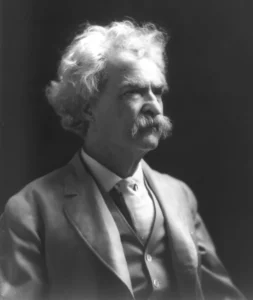
THE CYNIC – Mark Twain (November 30, 1835 – April 21, 1910), was an American writer, humorist, entrepreneur, publisher, and lecturer. He was lauded as the “greatest humorist the United States has produced”, and William Faulkner called him “the father of American literature”. His novels include The Adventures of Tom Sawyer (1876) and its sequel, Adventures of Huckleberry Finn (1884), the latter of which has often been called the “Great American Novel”.
Skepticism is a state of doubt or a questioning of the validity of things. In Mark Twain’s writing, skepticism often took the form of satirical critiques of society, where he used humor to expose flaws and challenge widely held beliefs.
Mark Twain was skeptical of many things, including religion, politics, and human nature. He believed that people often held onto beliefs without questioning them and that this led to ignorance and prejudice. His skepticism was influenced by his own life experiences, including his travels and encounters with different cultures.
Twain was born two weeks after Halley’s Comet’s closest approach in 1835; and said characteristically in 1909:
“I came in with Halley’s Comet in 1835. It is coming again next year, and I expect to go out with it. It will be the greatest disappointment of my life if I don’t go out with Halley’s Comet. The Almighty has said, no doubt: “Now here are these two unaccountable freaks; they came in together, they must go out together”.
Twain’s prediction was accurate; he died of a heart attack on April 21, 1910, one day after the comet’s closest approach to Earth.
To understand Mark Twain’s cynicism in The Adventure of Huckleberry Finn it helps to know what satire is. It can be defined as a literary work holding up human vices and follies to ridicule or scorn and to expose and discredit vice or folly. It is the style of satire that Twain employs as a tool in his novels to exaggerate and make fun of the many problems facing American society.
In “The Adventures of Huckleberry Finn,” Mark Twain uses the character of Huck to challenge societal norms and beliefs about race and slavery. Huck’s skepticism is evident in his decision to help Jim, a runaway slave, although society sees this as wrong. In “The Mysterious Stranger,” Mark Twain portrays a character who is skeptical of religion and the concept of God. This character challenges the beliefs of those around him and encourages them to question their own beliefs.
I wonder if Twain wasn’t really more of a cross between a stoic and a skeptic, somehow cynical because of an extremely witty mind. He certainly did not live in a barrel like the Greek cynic Diogenes. As an extremely perceptive liver/observer as well as gifted storyteller, Twain perhaps took his clues regarding the meaning of life from the strengths and frailties of human nature − to the end suggesting that the meaning of life is what it appears to be.
Mark Twain’s writing style, which often included humor and satire, was influential on American literature as a whole. His skepticism also inspired other writers to challenge societal norms and beliefs in their own works. For example, writers like Kurt Vonnegut and George Carlin were influenced by Mark Twain’s skepticism and used their own writing to challenge widely held beliefs.
In conclusion, Mark Twain’s skepticism was a defining aspect of his writing and his legacy. His willingness to question societal norms and beliefs continues to inspire readers and writers alike to think critically and challenge the world around them.


[…] like Mark Twain may have pointed out that this motto is little more than exploitative posturing, in fact only to […]